Comprehensive Analysis: Amnesia, Memory Loss, and Attention Deficits
VerifiedAdded on 2022/09/06
|11
|2513
|27
Report
AI Summary
This report investigates the multifaceted impact of amnesia on memory and attention, examining its effects on cognitive functions. It delves into how amnesia, a condition often preceding Alzheimer's disease, disrupts both short-term and long-term memory, thereby affecting attention and concentration. The report explores various theories of human amnesia, including semantic encoding, trace decay, cue-dependent forgetting, and context encoding, and their implications. It highlights the role of the inferior frontal junction (IFJ) in attention and working memory, and discusses how factors like depression, radiation therapy, and drug use can exacerbate amnesia. The report draws on various studies and surveys to illustrate the cognitive challenges faced by individuals with amnesia, emphasizing the importance of understanding its effects on daily life and cognitive abilities.
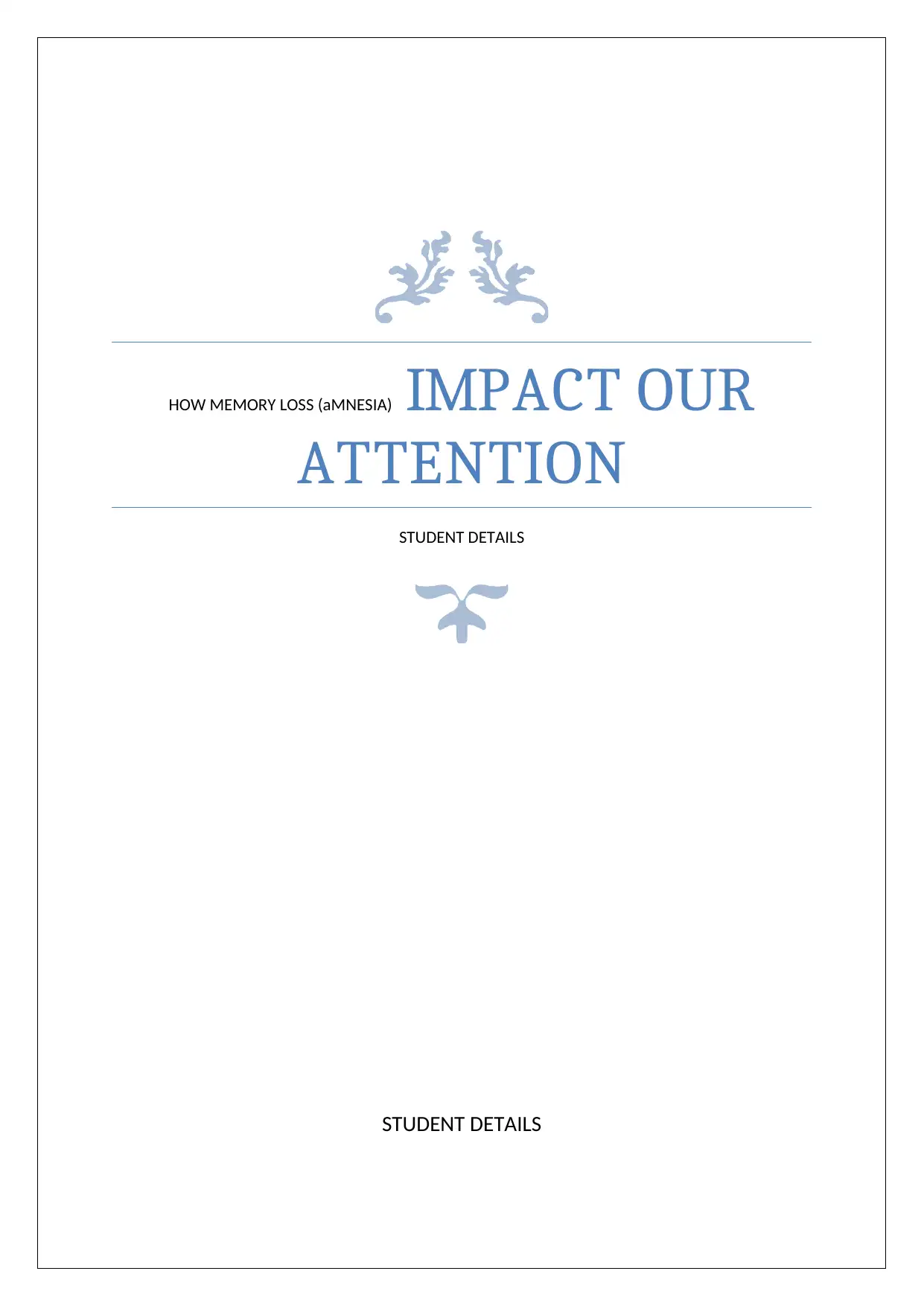
HOW MEMORY LOSS (aMNESIA) IMPACT OUR
ATTENTION
STUDENT DETAILS
STUDENT DETAILS
ATTENTION
STUDENT DETAILS
STUDENT DETAILS
Paraphrase This Document
Need a fresh take? Get an instant paraphrase of this document with our AI Paraphraser
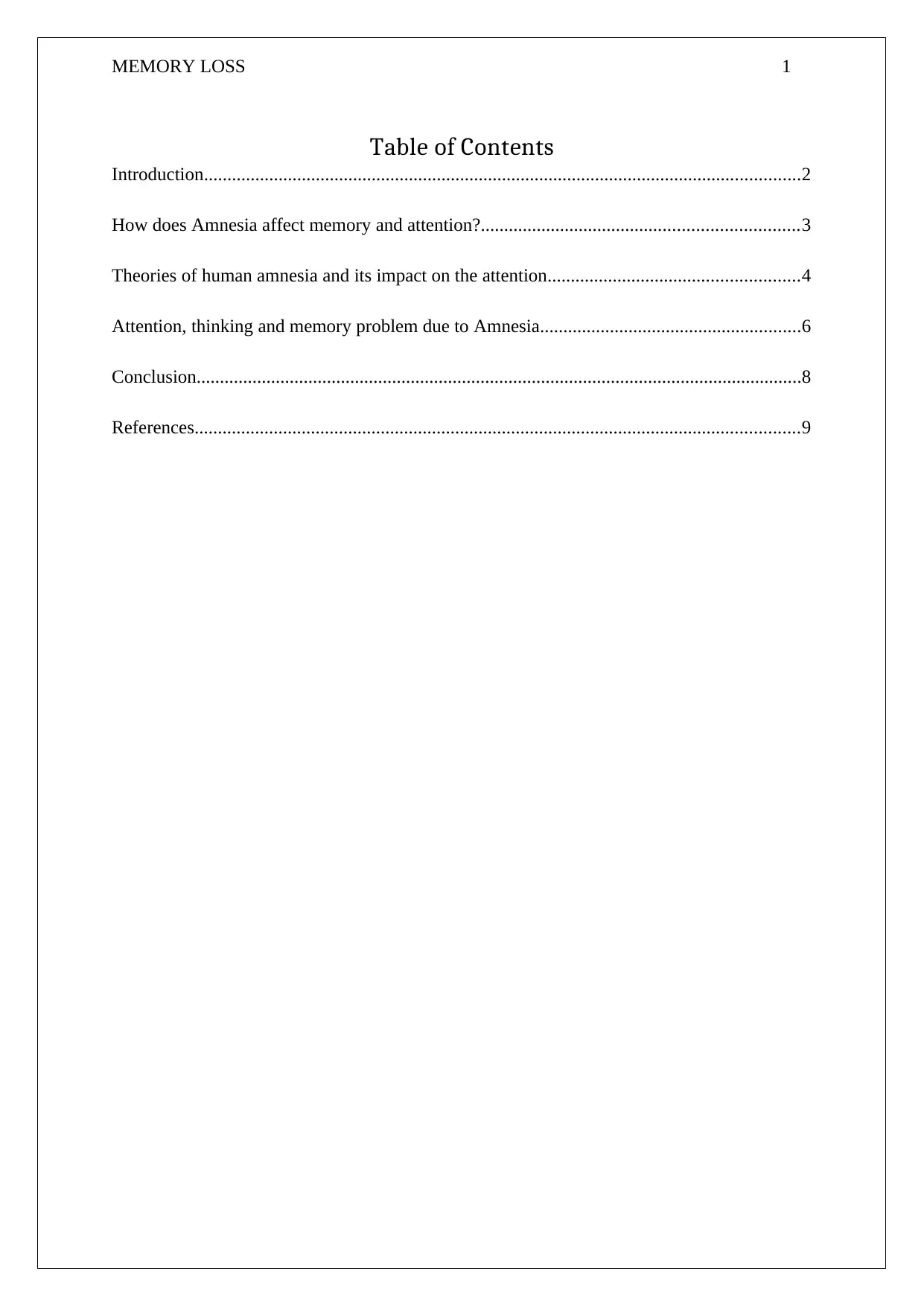
MEMORY LOSS 1
Table of Contents
Introduction................................................................................................................................2
How does Amnesia affect memory and attention?....................................................................3
Theories of human amnesia and its impact on the attention......................................................4
Attention, thinking and memory problem due to Amnesia........................................................6
Conclusion..................................................................................................................................8
References..................................................................................................................................9
Table of Contents
Introduction................................................................................................................................2
How does Amnesia affect memory and attention?....................................................................3
Theories of human amnesia and its impact on the attention......................................................4
Attention, thinking and memory problem due to Amnesia........................................................6
Conclusion..................................................................................................................................8
References..................................................................................................................................9
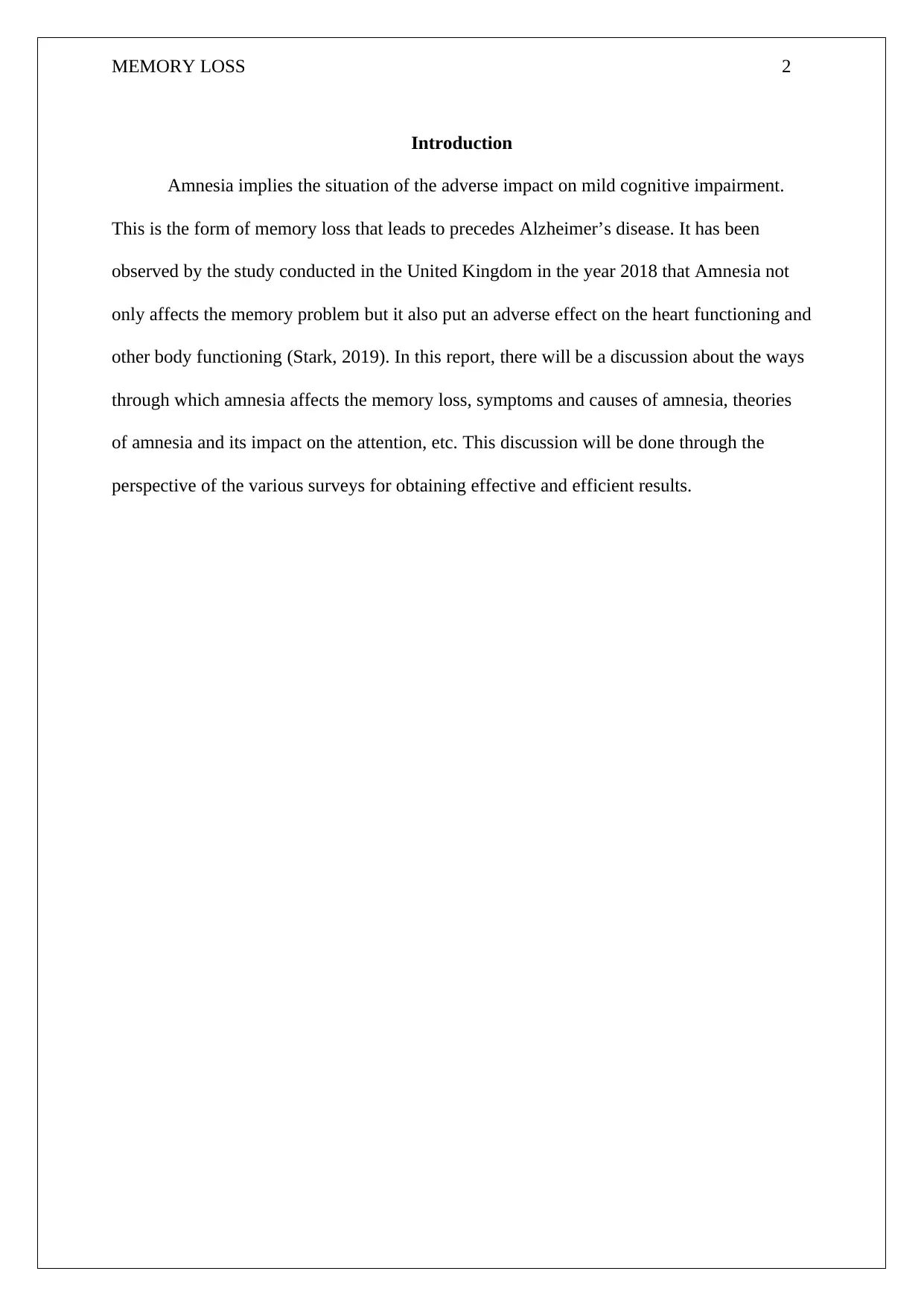
MEMORY LOSS 2
Introduction
Amnesia implies the situation of the adverse impact on mild cognitive impairment.
This is the form of memory loss that leads to precedes Alzheimer’s disease. It has been
observed by the study conducted in the United Kingdom in the year 2018 that Amnesia not
only affects the memory problem but it also put an adverse effect on the heart functioning and
other body functioning (Stark, 2019). In this report, there will be a discussion about the ways
through which amnesia affects the memory loss, symptoms and causes of amnesia, theories
of amnesia and its impact on the attention, etc. This discussion will be done through the
perspective of the various surveys for obtaining effective and efficient results.
Introduction
Amnesia implies the situation of the adverse impact on mild cognitive impairment.
This is the form of memory loss that leads to precedes Alzheimer’s disease. It has been
observed by the study conducted in the United Kingdom in the year 2018 that Amnesia not
only affects the memory problem but it also put an adverse effect on the heart functioning and
other body functioning (Stark, 2019). In this report, there will be a discussion about the ways
through which amnesia affects the memory loss, symptoms and causes of amnesia, theories
of amnesia and its impact on the attention, etc. This discussion will be done through the
perspective of the various surveys for obtaining effective and efficient results.
⊘ This is a preview!⊘
Do you want full access?
Subscribe today to unlock all pages.

Trusted by 1+ million students worldwide
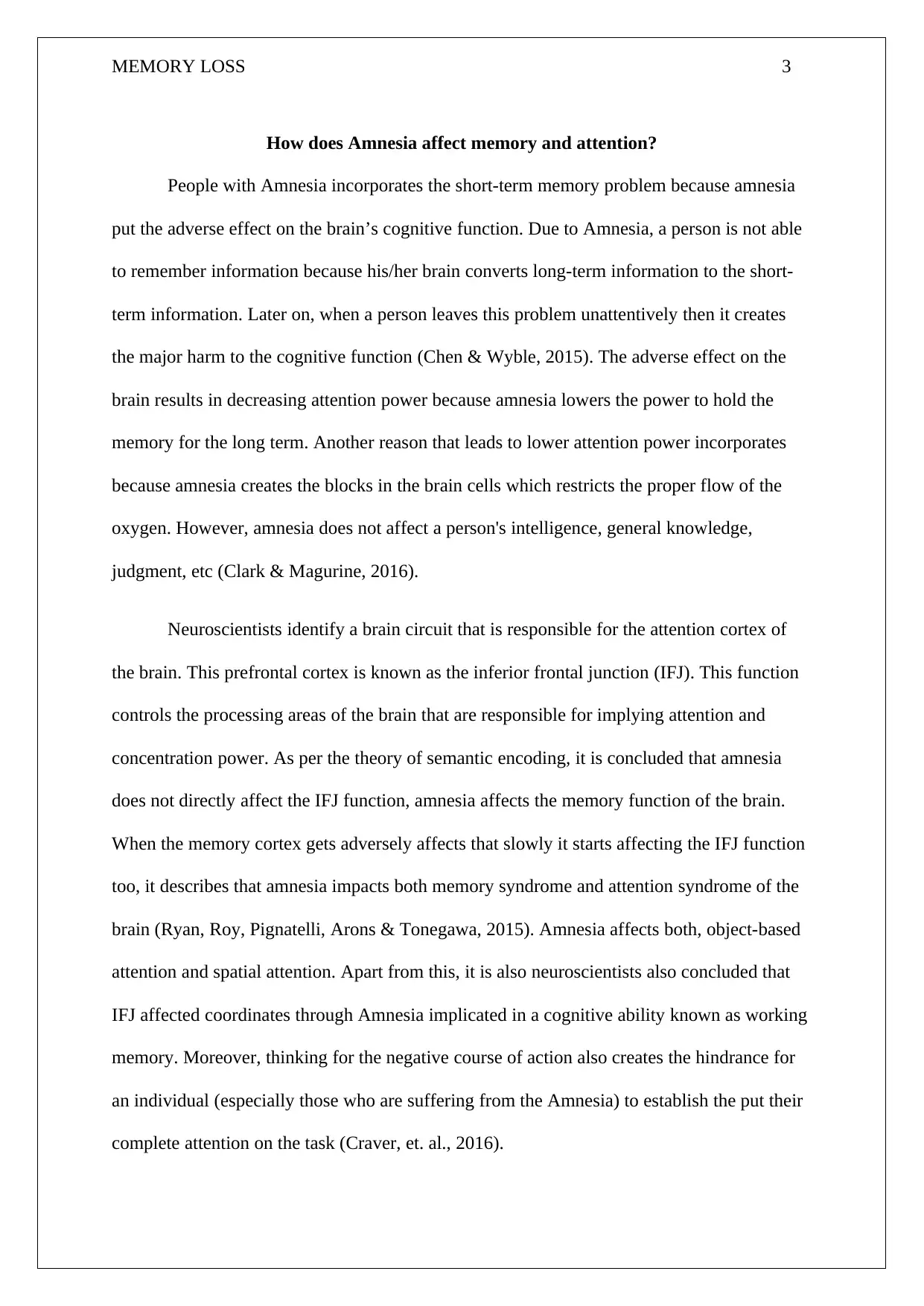
MEMORY LOSS 3
How does Amnesia affect memory and attention?
People with Amnesia incorporates the short-term memory problem because amnesia
put the adverse effect on the brain’s cognitive function. Due to Amnesia, a person is not able
to remember information because his/her brain converts long-term information to the short-
term information. Later on, when a person leaves this problem unattentively then it creates
the major harm to the cognitive function (Chen & Wyble, 2015). The adverse effect on the
brain results in decreasing attention power because amnesia lowers the power to hold the
memory for the long term. Another reason that leads to lower attention power incorporates
because amnesia creates the blocks in the brain cells which restricts the proper flow of the
oxygen. However, amnesia does not affect a person's intelligence, general knowledge,
judgment, etc (Clark & Magurine, 2016).
Neuroscientists identify a brain circuit that is responsible for the attention cortex of
the brain. This prefrontal cortex is known as the inferior frontal junction (IFJ). This function
controls the processing areas of the brain that are responsible for implying attention and
concentration power. As per the theory of semantic encoding, it is concluded that amnesia
does not directly affect the IFJ function, amnesia affects the memory function of the brain.
When the memory cortex gets adversely affects that slowly it starts affecting the IFJ function
too, it describes that amnesia impacts both memory syndrome and attention syndrome of the
brain (Ryan, Roy, Pignatelli, Arons & Tonegawa, 2015). Amnesia affects both, object-based
attention and spatial attention. Apart from this, it is also neuroscientists also concluded that
IFJ affected coordinates through Amnesia implicated in a cognitive ability known as working
memory. Moreover, thinking for the negative course of action also creates the hindrance for
an individual (especially those who are suffering from the Amnesia) to establish the put their
complete attention on the task (Craver, et. al., 2016).
How does Amnesia affect memory and attention?
People with Amnesia incorporates the short-term memory problem because amnesia
put the adverse effect on the brain’s cognitive function. Due to Amnesia, a person is not able
to remember information because his/her brain converts long-term information to the short-
term information. Later on, when a person leaves this problem unattentively then it creates
the major harm to the cognitive function (Chen & Wyble, 2015). The adverse effect on the
brain results in decreasing attention power because amnesia lowers the power to hold the
memory for the long term. Another reason that leads to lower attention power incorporates
because amnesia creates the blocks in the brain cells which restricts the proper flow of the
oxygen. However, amnesia does not affect a person's intelligence, general knowledge,
judgment, etc (Clark & Magurine, 2016).
Neuroscientists identify a brain circuit that is responsible for the attention cortex of
the brain. This prefrontal cortex is known as the inferior frontal junction (IFJ). This function
controls the processing areas of the brain that are responsible for implying attention and
concentration power. As per the theory of semantic encoding, it is concluded that amnesia
does not directly affect the IFJ function, amnesia affects the memory function of the brain.
When the memory cortex gets adversely affects that slowly it starts affecting the IFJ function
too, it describes that amnesia impacts both memory syndrome and attention syndrome of the
brain (Ryan, Roy, Pignatelli, Arons & Tonegawa, 2015). Amnesia affects both, object-based
attention and spatial attention. Apart from this, it is also neuroscientists also concluded that
IFJ affected coordinates through Amnesia implicated in a cognitive ability known as working
memory. Moreover, thinking for the negative course of action also creates the hindrance for
an individual (especially those who are suffering from the Amnesia) to establish the put their
complete attention on the task (Craver, et. al., 2016).
Paraphrase This Document
Need a fresh take? Get an instant paraphrase of this document with our AI Paraphraser
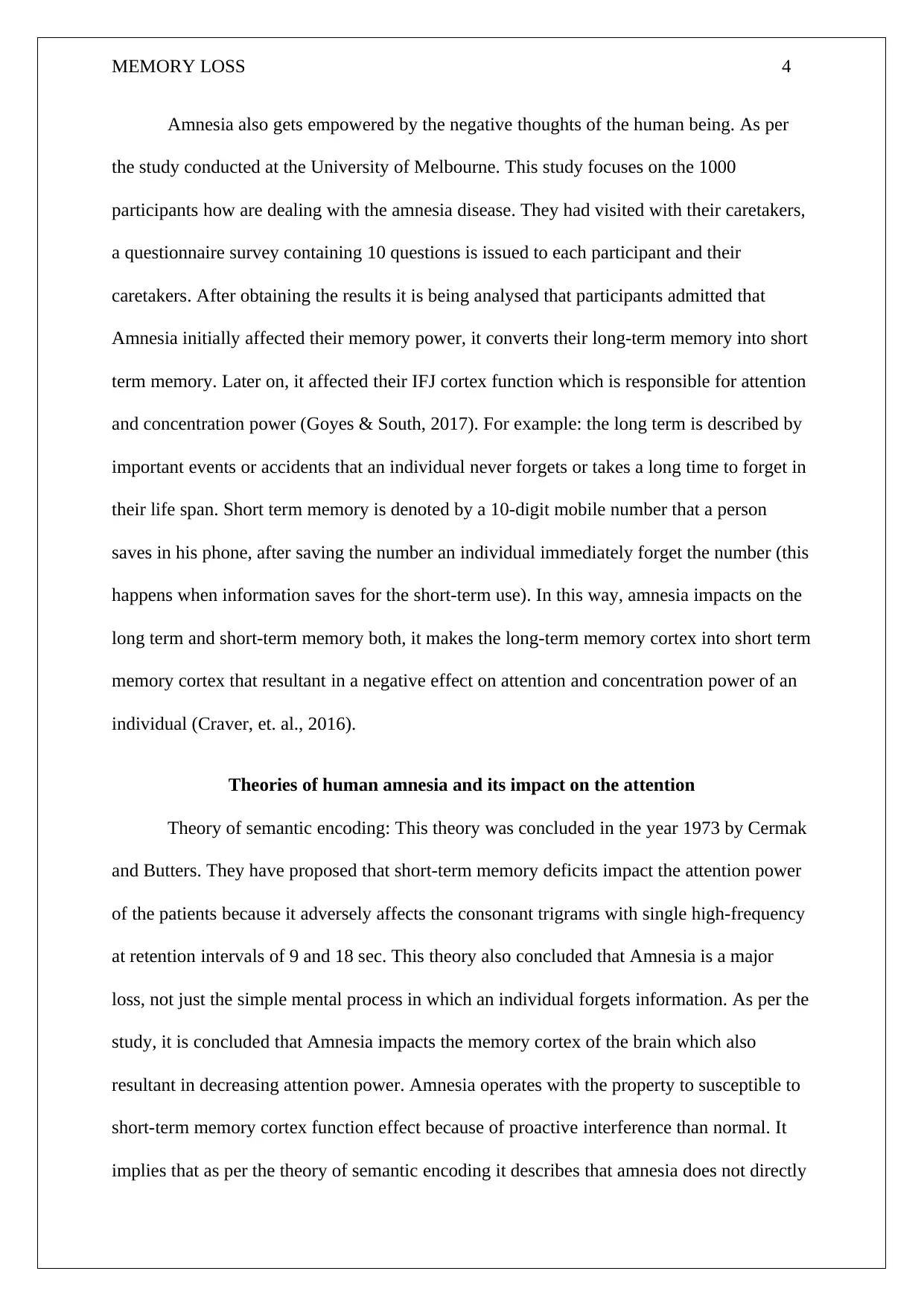
MEMORY LOSS 4
Amnesia also gets empowered by the negative thoughts of the human being. As per
the study conducted at the University of Melbourne. This study focuses on the 1000
participants how are dealing with the amnesia disease. They had visited with their caretakers,
a questionnaire survey containing 10 questions is issued to each participant and their
caretakers. After obtaining the results it is being analysed that participants admitted that
Amnesia initially affected their memory power, it converts their long-term memory into short
term memory. Later on, it affected their IFJ cortex function which is responsible for attention
and concentration power (Goyes & South, 2017). For example: the long term is described by
important events or accidents that an individual never forgets or takes a long time to forget in
their life span. Short term memory is denoted by a 10-digit mobile number that a person
saves in his phone, after saving the number an individual immediately forget the number (this
happens when information saves for the short-term use). In this way, amnesia impacts on the
long term and short-term memory both, it makes the long-term memory cortex into short term
memory cortex that resultant in a negative effect on attention and concentration power of an
individual (Craver, et. al., 2016).
Theories of human amnesia and its impact on the attention
Theory of semantic encoding: This theory was concluded in the year 1973 by Cermak
and Butters. They have proposed that short-term memory deficits impact the attention power
of the patients because it adversely affects the consonant trigrams with single high-frequency
at retention intervals of 9 and 18 sec. This theory also concluded that Amnesia is a major
loss, not just the simple mental process in which an individual forgets information. As per the
study, it is concluded that Amnesia impacts the memory cortex of the brain which also
resultant in decreasing attention power. Amnesia operates with the property to susceptible to
short-term memory cortex function effect because of proactive interference than normal. It
implies that as per the theory of semantic encoding it describes that amnesia does not directly
Amnesia also gets empowered by the negative thoughts of the human being. As per
the study conducted at the University of Melbourne. This study focuses on the 1000
participants how are dealing with the amnesia disease. They had visited with their caretakers,
a questionnaire survey containing 10 questions is issued to each participant and their
caretakers. After obtaining the results it is being analysed that participants admitted that
Amnesia initially affected their memory power, it converts their long-term memory into short
term memory. Later on, it affected their IFJ cortex function which is responsible for attention
and concentration power (Goyes & South, 2017). For example: the long term is described by
important events or accidents that an individual never forgets or takes a long time to forget in
their life span. Short term memory is denoted by a 10-digit mobile number that a person
saves in his phone, after saving the number an individual immediately forget the number (this
happens when information saves for the short-term use). In this way, amnesia impacts on the
long term and short-term memory both, it makes the long-term memory cortex into short term
memory cortex that resultant in a negative effect on attention and concentration power of an
individual (Craver, et. al., 2016).
Theories of human amnesia and its impact on the attention
Theory of semantic encoding: This theory was concluded in the year 1973 by Cermak
and Butters. They have proposed that short-term memory deficits impact the attention power
of the patients because it adversely affects the consonant trigrams with single high-frequency
at retention intervals of 9 and 18 sec. This theory also concluded that Amnesia is a major
loss, not just the simple mental process in which an individual forgets information. As per the
study, it is concluded that Amnesia impacts the memory cortex of the brain which also
resultant in decreasing attention power. Amnesia operates with the property to susceptible to
short-term memory cortex function effect because of proactive interference than normal. It
implies that as per the theory of semantic encoding it describes that amnesia does not directly
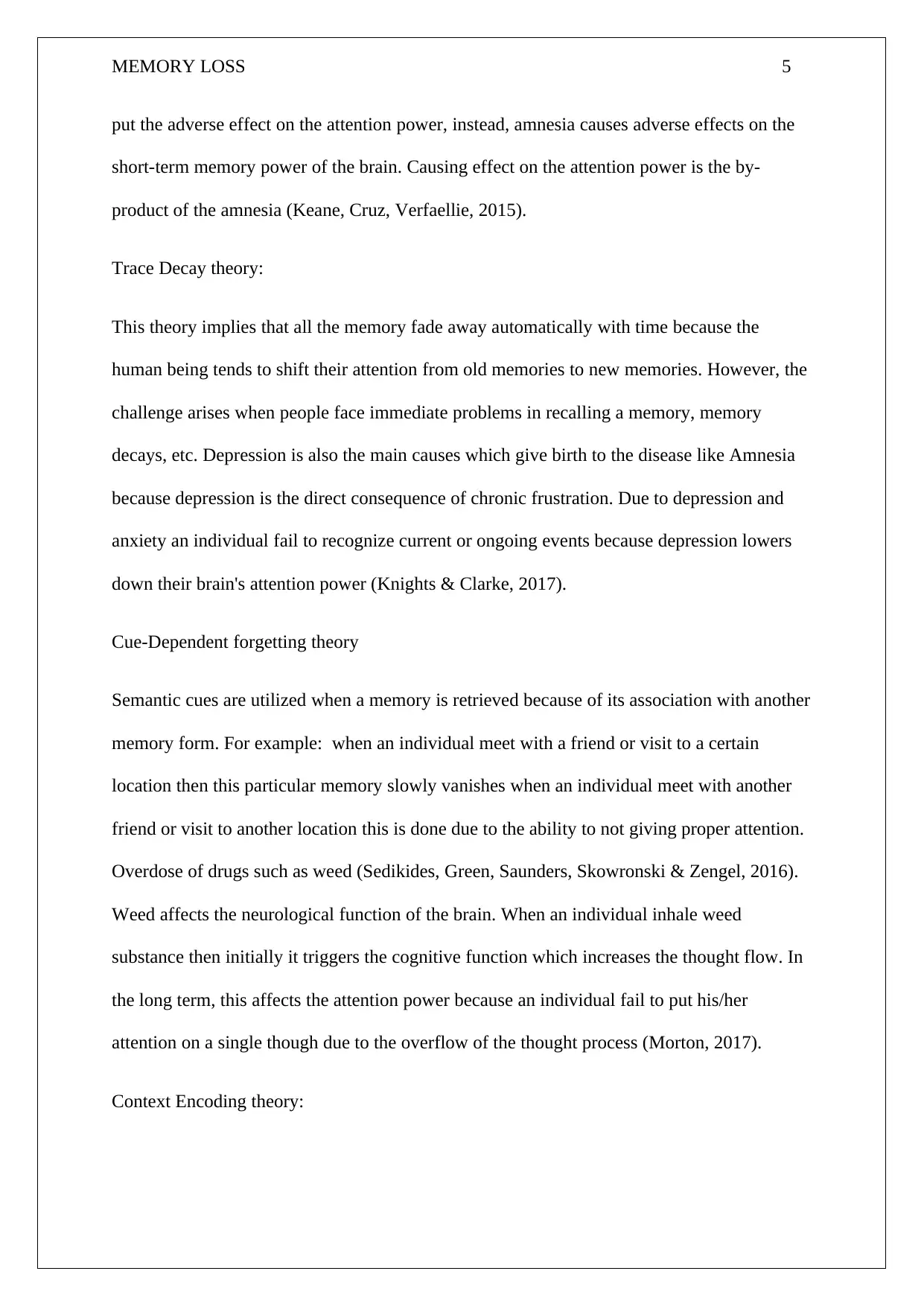
MEMORY LOSS 5
put the adverse effect on the attention power, instead, amnesia causes adverse effects on the
short-term memory power of the brain. Causing effect on the attention power is the by-
product of the amnesia (Keane, Cruz, Verfaellie, 2015).
Trace Decay theory:
This theory implies that all the memory fade away automatically with time because the
human being tends to shift their attention from old memories to new memories. However, the
challenge arises when people face immediate problems in recalling a memory, memory
decays, etc. Depression is also the main causes which give birth to the disease like Amnesia
because depression is the direct consequence of chronic frustration. Due to depression and
anxiety an individual fail to recognize current or ongoing events because depression lowers
down their brain's attention power (Knights & Clarke, 2017).
Cue-Dependent forgetting theory
Semantic cues are utilized when a memory is retrieved because of its association with another
memory form. For example: when an individual meet with a friend or visit to a certain
location then this particular memory slowly vanishes when an individual meet with another
friend or visit to another location this is done due to the ability to not giving proper attention.
Overdose of drugs such as weed (Sedikides, Green, Saunders, Skowronski & Zengel, 2016).
Weed affects the neurological function of the brain. When an individual inhale weed
substance then initially it triggers the cognitive function which increases the thought flow. In
the long term, this affects the attention power because an individual fail to put his/her
attention on a single though due to the overflow of the thought process (Morton, 2017).
Context Encoding theory:
put the adverse effect on the attention power, instead, amnesia causes adverse effects on the
short-term memory power of the brain. Causing effect on the attention power is the by-
product of the amnesia (Keane, Cruz, Verfaellie, 2015).
Trace Decay theory:
This theory implies that all the memory fade away automatically with time because the
human being tends to shift their attention from old memories to new memories. However, the
challenge arises when people face immediate problems in recalling a memory, memory
decays, etc. Depression is also the main causes which give birth to the disease like Amnesia
because depression is the direct consequence of chronic frustration. Due to depression and
anxiety an individual fail to recognize current or ongoing events because depression lowers
down their brain's attention power (Knights & Clarke, 2017).
Cue-Dependent forgetting theory
Semantic cues are utilized when a memory is retrieved because of its association with another
memory form. For example: when an individual meet with a friend or visit to a certain
location then this particular memory slowly vanishes when an individual meet with another
friend or visit to another location this is done due to the ability to not giving proper attention.
Overdose of drugs such as weed (Sedikides, Green, Saunders, Skowronski & Zengel, 2016).
Weed affects the neurological function of the brain. When an individual inhale weed
substance then initially it triggers the cognitive function which increases the thought flow. In
the long term, this affects the attention power because an individual fail to put his/her
attention on a single though due to the overflow of the thought process (Morton, 2017).
Context Encoding theory:
⊘ This is a preview!⊘
Do you want full access?
Subscribe today to unlock all pages.

Trusted by 1+ million students worldwide
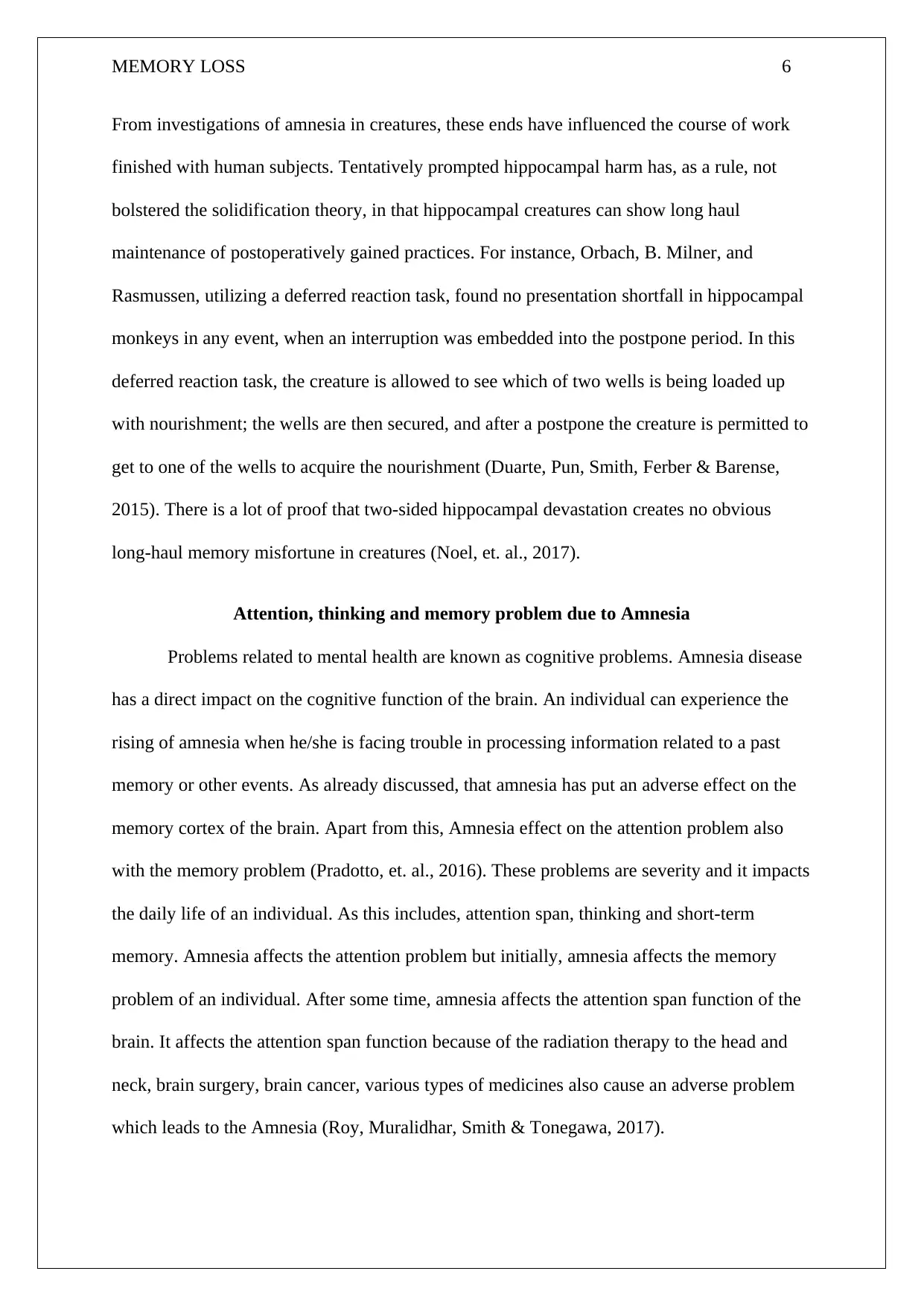
MEMORY LOSS 6
From investigations of amnesia in creatures, these ends have influenced the course of work
finished with human subjects. Tentatively prompted hippocampal harm has, as a rule, not
bolstered the solidification theory, in that hippocampal creatures can show long haul
maintenance of postoperatively gained practices. For instance, Orbach, B. Milner, and
Rasmussen, utilizing a deferred reaction task, found no presentation shortfall in hippocampal
monkeys in any event, when an interruption was embedded into the postpone period. In this
deferred reaction task, the creature is allowed to see which of two wells is being loaded up
with nourishment; the wells are then secured, and after a postpone the creature is permitted to
get to one of the wells to acquire the nourishment (Duarte, Pun, Smith, Ferber & Barense,
2015). There is a lot of proof that two-sided hippocampal devastation creates no obvious
long-haul memory misfortune in creatures (Noel, et. al., 2017).
Attention, thinking and memory problem due to Amnesia
Problems related to mental health are known as cognitive problems. Amnesia disease
has a direct impact on the cognitive function of the brain. An individual can experience the
rising of amnesia when he/she is facing trouble in processing information related to a past
memory or other events. As already discussed, that amnesia has put an adverse effect on the
memory cortex of the brain. Apart from this, Amnesia effect on the attention problem also
with the memory problem (Pradotto, et. al., 2016). These problems are severity and it impacts
the daily life of an individual. As this includes, attention span, thinking and short-term
memory. Amnesia affects the attention problem but initially, amnesia affects the memory
problem of an individual. After some time, amnesia affects the attention span function of the
brain. It affects the attention span function because of the radiation therapy to the head and
neck, brain surgery, brain cancer, various types of medicines also cause an adverse problem
which leads to the Amnesia (Roy, Muralidhar, Smith & Tonegawa, 2017).
From investigations of amnesia in creatures, these ends have influenced the course of work
finished with human subjects. Tentatively prompted hippocampal harm has, as a rule, not
bolstered the solidification theory, in that hippocampal creatures can show long haul
maintenance of postoperatively gained practices. For instance, Orbach, B. Milner, and
Rasmussen, utilizing a deferred reaction task, found no presentation shortfall in hippocampal
monkeys in any event, when an interruption was embedded into the postpone period. In this
deferred reaction task, the creature is allowed to see which of two wells is being loaded up
with nourishment; the wells are then secured, and after a postpone the creature is permitted to
get to one of the wells to acquire the nourishment (Duarte, Pun, Smith, Ferber & Barense,
2015). There is a lot of proof that two-sided hippocampal devastation creates no obvious
long-haul memory misfortune in creatures (Noel, et. al., 2017).
Attention, thinking and memory problem due to Amnesia
Problems related to mental health are known as cognitive problems. Amnesia disease
has a direct impact on the cognitive function of the brain. An individual can experience the
rising of amnesia when he/she is facing trouble in processing information related to a past
memory or other events. As already discussed, that amnesia has put an adverse effect on the
memory cortex of the brain. Apart from this, Amnesia effect on the attention problem also
with the memory problem (Pradotto, et. al., 2016). These problems are severity and it impacts
the daily life of an individual. As this includes, attention span, thinking and short-term
memory. Amnesia affects the attention problem but initially, amnesia affects the memory
problem of an individual. After some time, amnesia affects the attention span function of the
brain. It affects the attention span function because of the radiation therapy to the head and
neck, brain surgery, brain cancer, various types of medicines also cause an adverse problem
which leads to the Amnesia (Roy, Muralidhar, Smith & Tonegawa, 2017).
Paraphrase This Document
Need a fresh take? Get an instant paraphrase of this document with our AI Paraphraser
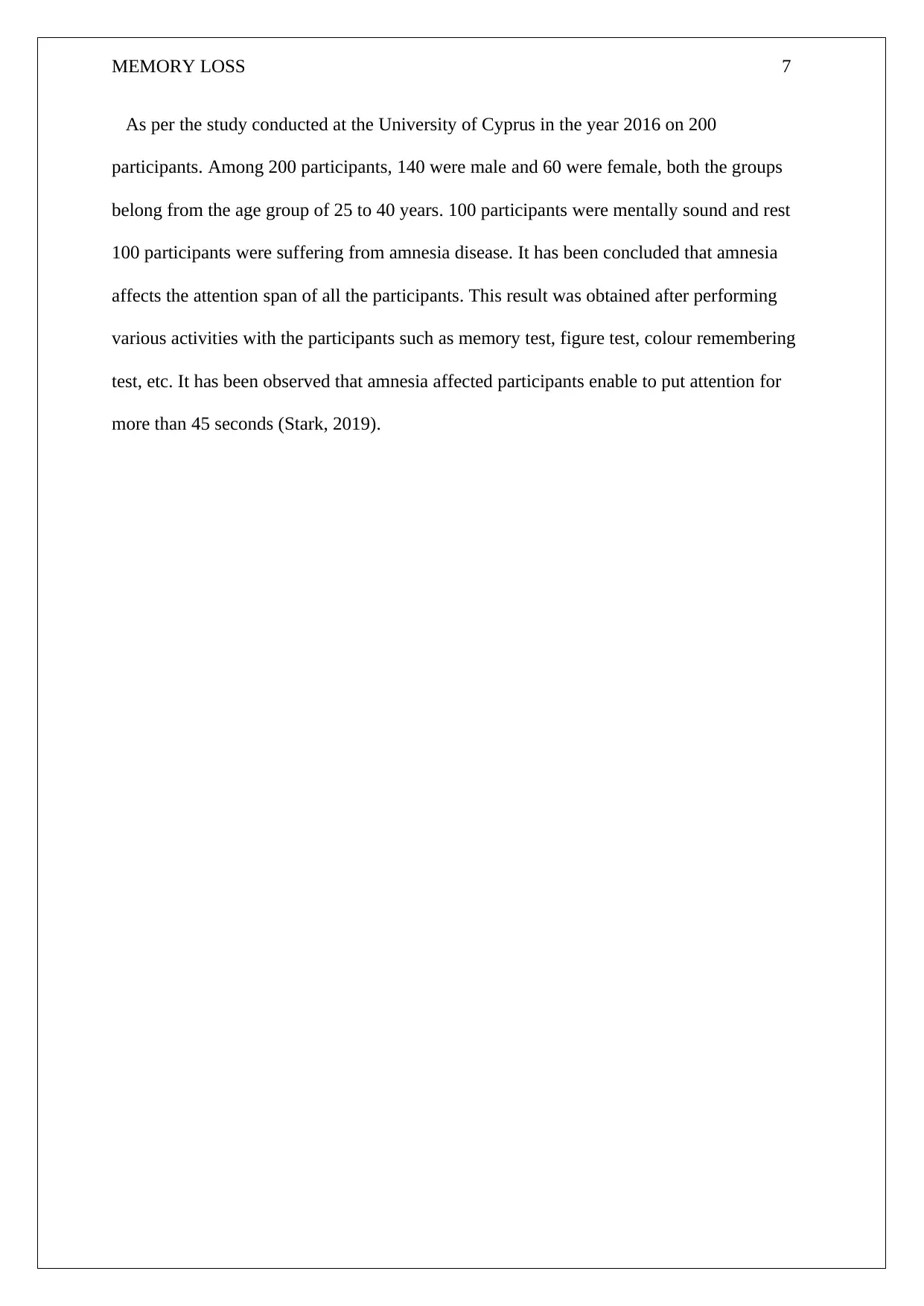
MEMORY LOSS 7
As per the study conducted at the University of Cyprus in the year 2016 on 200
participants. Among 200 participants, 140 were male and 60 were female, both the groups
belong from the age group of 25 to 40 years. 100 participants were mentally sound and rest
100 participants were suffering from amnesia disease. It has been concluded that amnesia
affects the attention span of all the participants. This result was obtained after performing
various activities with the participants such as memory test, figure test, colour remembering
test, etc. It has been observed that amnesia affected participants enable to put attention for
more than 45 seconds (Stark, 2019).
As per the study conducted at the University of Cyprus in the year 2016 on 200
participants. Among 200 participants, 140 were male and 60 were female, both the groups
belong from the age group of 25 to 40 years. 100 participants were mentally sound and rest
100 participants were suffering from amnesia disease. It has been concluded that amnesia
affects the attention span of all the participants. This result was obtained after performing
various activities with the participants such as memory test, figure test, colour remembering
test, etc. It has been observed that amnesia affected participants enable to put attention for
more than 45 seconds (Stark, 2019).
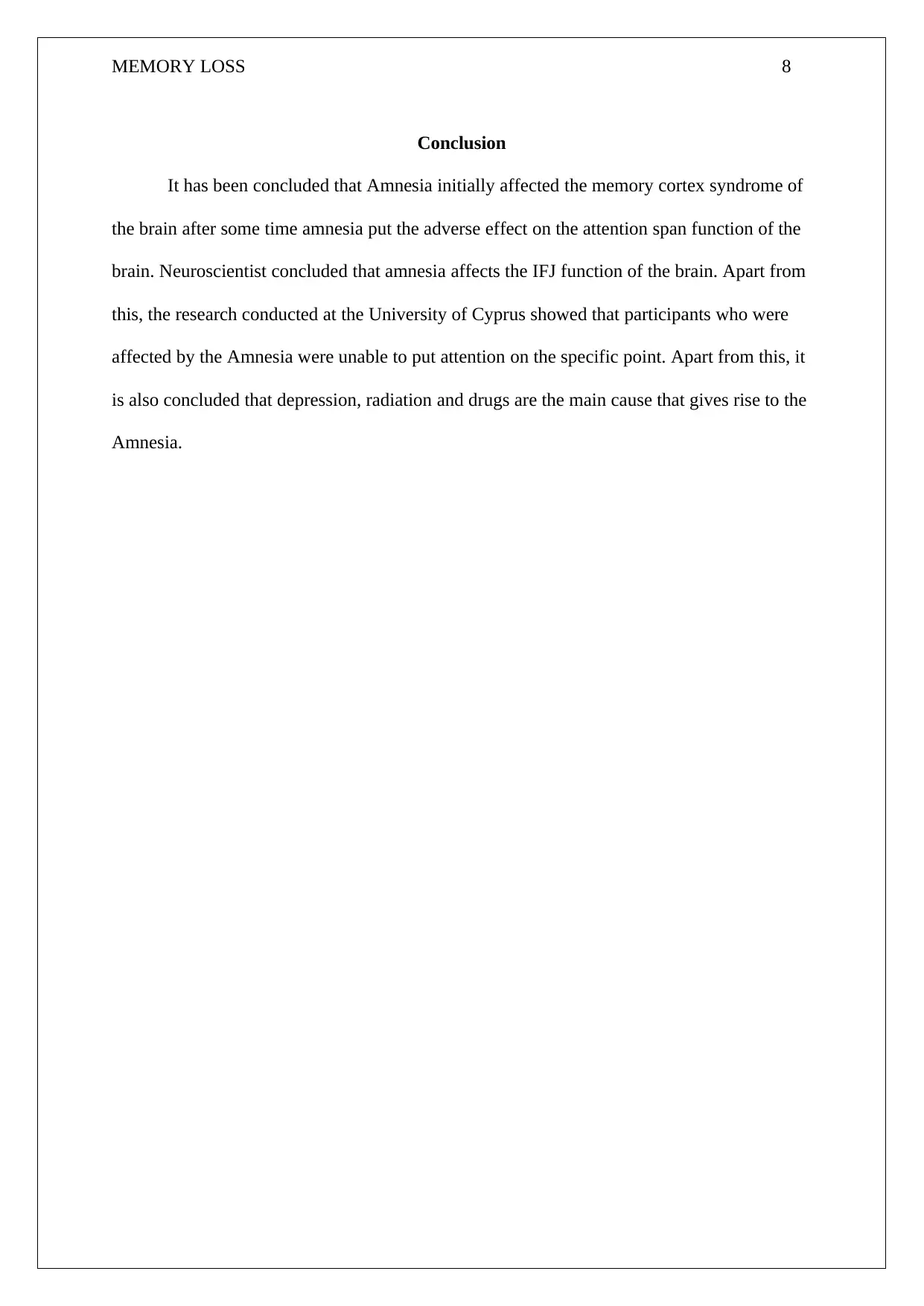
MEMORY LOSS 8
Conclusion
It has been concluded that Amnesia initially affected the memory cortex syndrome of
the brain after some time amnesia put the adverse effect on the attention span function of the
brain. Neuroscientist concluded that amnesia affects the IFJ function of the brain. Apart from
this, the research conducted at the University of Cyprus showed that participants who were
affected by the Amnesia were unable to put attention on the specific point. Apart from this, it
is also concluded that depression, radiation and drugs are the main cause that gives rise to the
Amnesia.
Conclusion
It has been concluded that Amnesia initially affected the memory cortex syndrome of
the brain after some time amnesia put the adverse effect on the attention span function of the
brain. Neuroscientist concluded that amnesia affects the IFJ function of the brain. Apart from
this, the research conducted at the University of Cyprus showed that participants who were
affected by the Amnesia were unable to put attention on the specific point. Apart from this, it
is also concluded that depression, radiation and drugs are the main cause that gives rise to the
Amnesia.
⊘ This is a preview!⊘
Do you want full access?
Subscribe today to unlock all pages.

Trusted by 1+ million students worldwide
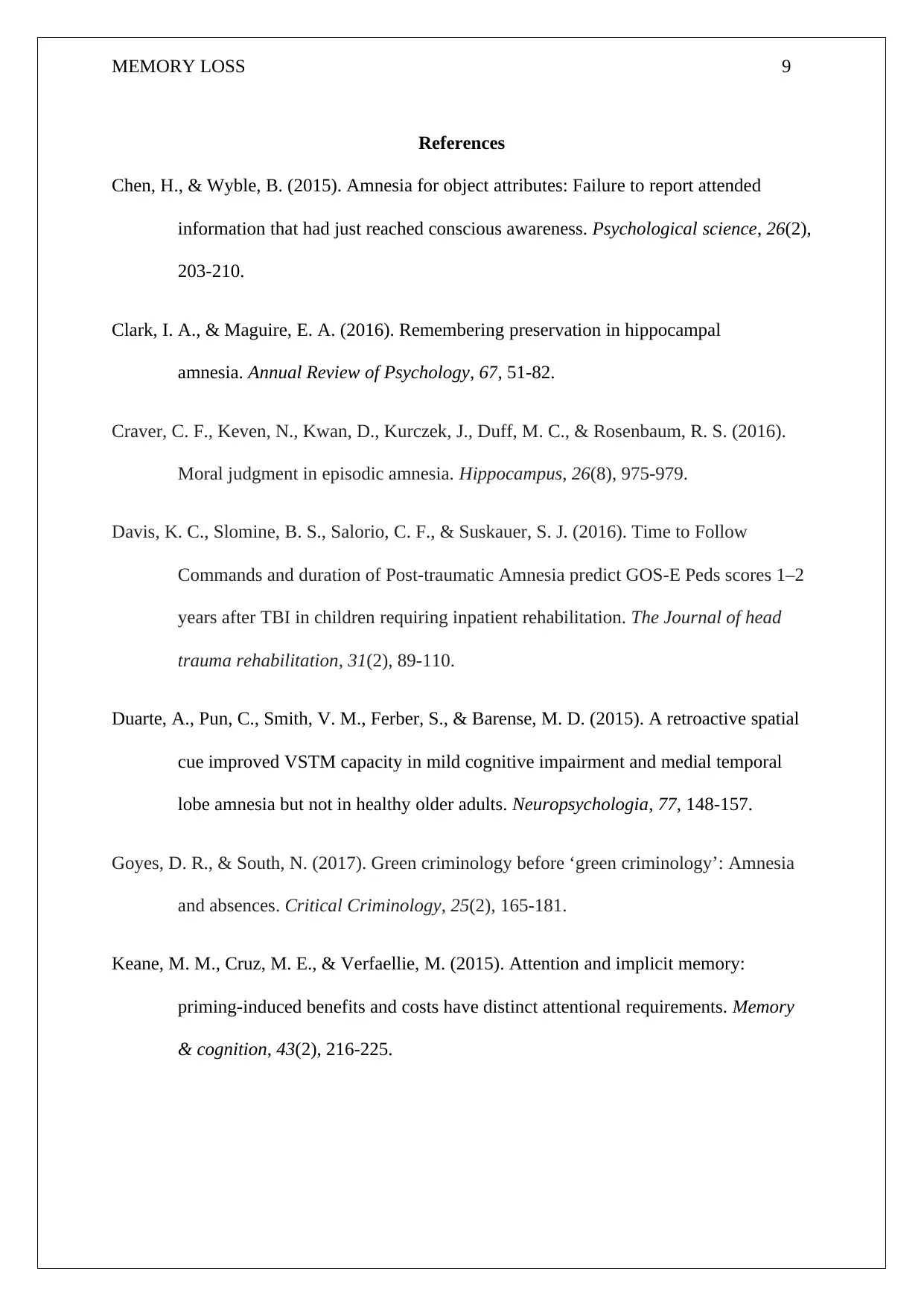
MEMORY LOSS 9
References
Chen, H., & Wyble, B. (2015). Amnesia for object attributes: Failure to report attended
information that had just reached conscious awareness. Psychological science, 26(2),
203-210.
Clark, I. A., & Maguire, E. A. (2016). Remembering preservation in hippocampal
amnesia. Annual Review of Psychology, 67, 51-82.
Craver, C. F., Keven, N., Kwan, D., Kurczek, J., Duff, M. C., & Rosenbaum, R. S. (2016).
Moral judgment in episodic amnesia. Hippocampus, 26(8), 975-979.
Davis, K. C., Slomine, B. S., Salorio, C. F., & Suskauer, S. J. (2016). Time to Follow
Commands and duration of Post-traumatic Amnesia predict GOS-E Peds scores 1–2
years after TBI in children requiring inpatient rehabilitation. The Journal of head
trauma rehabilitation, 31(2), 89-110.
Duarte, A., Pun, C., Smith, V. M., Ferber, S., & Barense, M. D. (2015). A retroactive spatial
cue improved VSTM capacity in mild cognitive impairment and medial temporal
lobe amnesia but not in healthy older adults. Neuropsychologia, 77, 148-157.
Goyes, D. R., & South, N. (2017). Green criminology before ‘green criminology’: Amnesia
and absences. Critical Criminology, 25(2), 165-181.
Keane, M. M., Cruz, M. E., & Verfaellie, M. (2015). Attention and implicit memory:
priming-induced benefits and costs have distinct attentional requirements. Memory
& cognition, 43(2), 216-225.
References
Chen, H., & Wyble, B. (2015). Amnesia for object attributes: Failure to report attended
information that had just reached conscious awareness. Psychological science, 26(2),
203-210.
Clark, I. A., & Maguire, E. A. (2016). Remembering preservation in hippocampal
amnesia. Annual Review of Psychology, 67, 51-82.
Craver, C. F., Keven, N., Kwan, D., Kurczek, J., Duff, M. C., & Rosenbaum, R. S. (2016).
Moral judgment in episodic amnesia. Hippocampus, 26(8), 975-979.
Davis, K. C., Slomine, B. S., Salorio, C. F., & Suskauer, S. J. (2016). Time to Follow
Commands and duration of Post-traumatic Amnesia predict GOS-E Peds scores 1–2
years after TBI in children requiring inpatient rehabilitation. The Journal of head
trauma rehabilitation, 31(2), 89-110.
Duarte, A., Pun, C., Smith, V. M., Ferber, S., & Barense, M. D. (2015). A retroactive spatial
cue improved VSTM capacity in mild cognitive impairment and medial temporal
lobe amnesia but not in healthy older adults. Neuropsychologia, 77, 148-157.
Goyes, D. R., & South, N. (2017). Green criminology before ‘green criminology’: Amnesia
and absences. Critical Criminology, 25(2), 165-181.
Keane, M. M., Cruz, M. E., & Verfaellie, M. (2015). Attention and implicit memory:
priming-induced benefits and costs have distinct attentional requirements. Memory
& cognition, 43(2), 216-225.
Paraphrase This Document
Need a fresh take? Get an instant paraphrase of this document with our AI Paraphraser
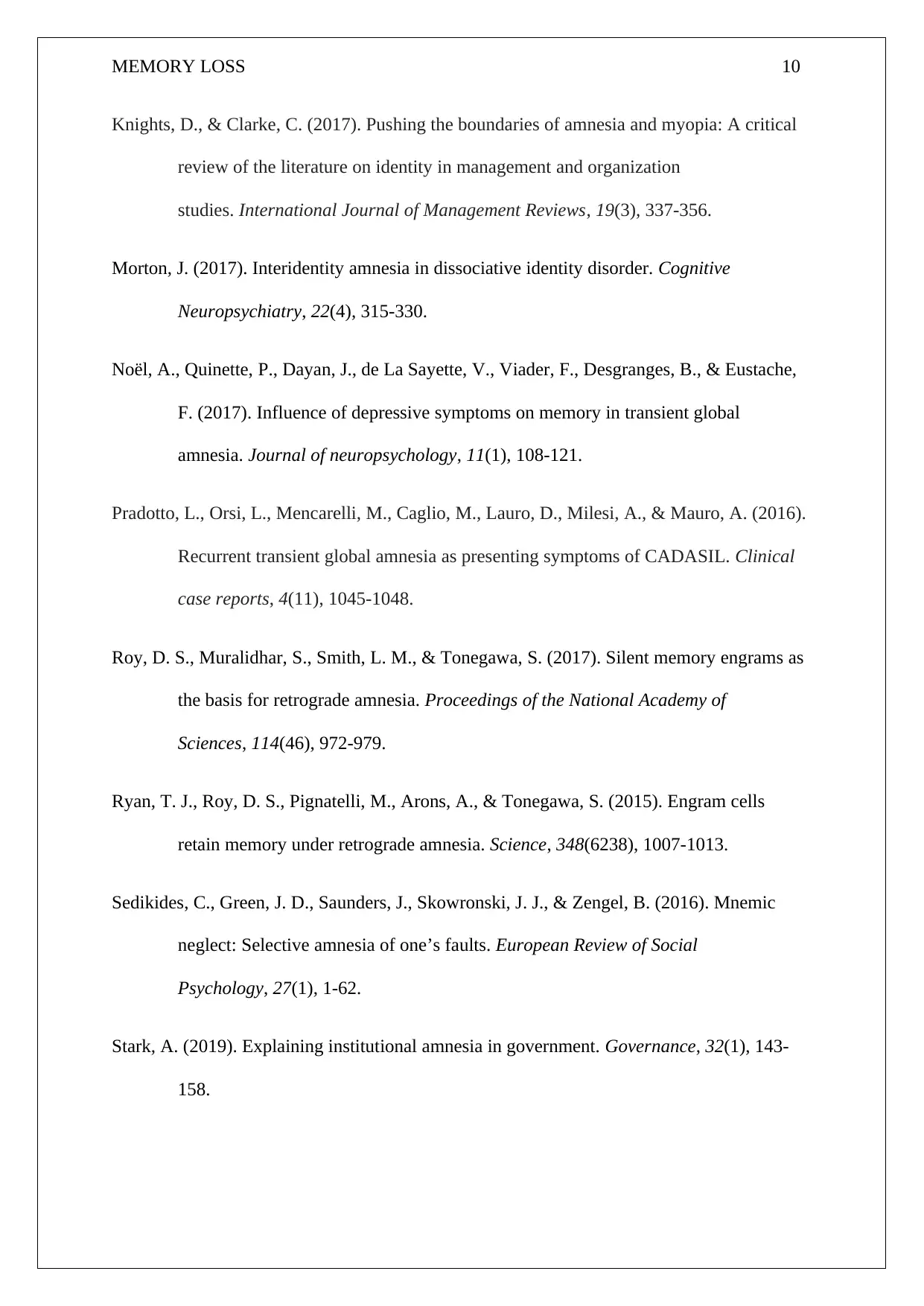
MEMORY LOSS 10
Knights, D., & Clarke, C. (2017). Pushing the boundaries of amnesia and myopia: A critical
review of the literature on identity in management and organization
studies. International Journal of Management Reviews, 19(3), 337-356.
Morton, J. (2017). Interidentity amnesia in dissociative identity disorder. Cognitive
Neuropsychiatry, 22(4), 315-330.
Noël, A., Quinette, P., Dayan, J., de La Sayette, V., Viader, F., Desgranges, B., & Eustache,
F. (2017). Influence of depressive symptoms on memory in transient global
amnesia. Journal of neuropsychology, 11(1), 108-121.
Pradotto, L., Orsi, L., Mencarelli, M., Caglio, M., Lauro, D., Milesi, A., & Mauro, A. (2016).
Recurrent transient global amnesia as presenting symptoms of CADASIL. Clinical
case reports, 4(11), 1045-1048.
Roy, D. S., Muralidhar, S., Smith, L. M., & Tonegawa, S. (2017). Silent memory engrams as
the basis for retrograde amnesia. Proceedings of the National Academy of
Sciences, 114(46), 972-979.
Ryan, T. J., Roy, D. S., Pignatelli, M., Arons, A., & Tonegawa, S. (2015). Engram cells
retain memory under retrograde amnesia. Science, 348(6238), 1007-1013.
Sedikides, C., Green, J. D., Saunders, J., Skowronski, J. J., & Zengel, B. (2016). Mnemic
neglect: Selective amnesia of one’s faults. European Review of Social
Psychology, 27(1), 1-62.
Stark, A. (2019). Explaining institutional amnesia in government. Governance, 32(1), 143-
158.
Knights, D., & Clarke, C. (2017). Pushing the boundaries of amnesia and myopia: A critical
review of the literature on identity in management and organization
studies. International Journal of Management Reviews, 19(3), 337-356.
Morton, J. (2017). Interidentity amnesia in dissociative identity disorder. Cognitive
Neuropsychiatry, 22(4), 315-330.
Noël, A., Quinette, P., Dayan, J., de La Sayette, V., Viader, F., Desgranges, B., & Eustache,
F. (2017). Influence of depressive symptoms on memory in transient global
amnesia. Journal of neuropsychology, 11(1), 108-121.
Pradotto, L., Orsi, L., Mencarelli, M., Caglio, M., Lauro, D., Milesi, A., & Mauro, A. (2016).
Recurrent transient global amnesia as presenting symptoms of CADASIL. Clinical
case reports, 4(11), 1045-1048.
Roy, D. S., Muralidhar, S., Smith, L. M., & Tonegawa, S. (2017). Silent memory engrams as
the basis for retrograde amnesia. Proceedings of the National Academy of
Sciences, 114(46), 972-979.
Ryan, T. J., Roy, D. S., Pignatelli, M., Arons, A., & Tonegawa, S. (2015). Engram cells
retain memory under retrograde amnesia. Science, 348(6238), 1007-1013.
Sedikides, C., Green, J. D., Saunders, J., Skowronski, J. J., & Zengel, B. (2016). Mnemic
neglect: Selective amnesia of one’s faults. European Review of Social
Psychology, 27(1), 1-62.
Stark, A. (2019). Explaining institutional amnesia in government. Governance, 32(1), 143-
158.
1 out of 11
Related Documents
Your All-in-One AI-Powered Toolkit for Academic Success.
+13062052269
info@desklib.com
Available 24*7 on WhatsApp / Email
![[object Object]](/_next/static/media/star-bottom.7253800d.svg)
Unlock your academic potential
Copyright © 2020–2025 A2Z Services. All Rights Reserved. Developed and managed by ZUCOL.


